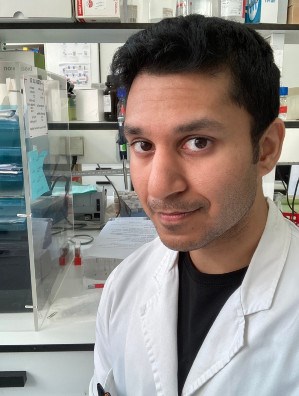New study on whether a probiotic bacteria can strengthen the intestinal barrier function in patients with Parkinson's
Researchers from Örebro University will investigate whether a bacteria can strengthen the intestinal immune system in patients with Parkinson's - and who may be receptive to treatment. The project has received €40 000 from The European Society for Clinical Nutrition and Metabolism (ESPEN).
- Most patients with Parkinson's disease have bowel symptoms, sometimes present several years before the disease is detected. Recent findings suggest that the immune cells and nerve cells of the intestine could play an important role in the development of the disease, says Dr John-Peter Ganda Mall , researcher in biomedicine at Örebro University.

Approximately 20,000 people live with Parkinson's in Sweden. Tremors, slowness and stiffness are common complaints as the disease affects the ability to control the body. In addition, most suffer from bowel problems such as constipation.
- The connection between the gut and the brain can play an important role for the symptoms and the development of Parkinson's. When the intestinal barrier is disrupted, a mild inflammation could manifest which could be an underlying cause for the bowel problems that affect patients with Parkinson's, says Dr John-Peter Ganda Mall.
The researchers will investigate whether a specific probiotic bacterium, Akkermansia muciniphila, can strengthen the intestinal barrier and, in the long run, possibly reduce the common bowel symptoms. The bacteria is normally found in the gut microbiota and has been shown to have positive effects in previous studies - but has yet not been studied in patients with Parkinson's.
In this project, the rare and powerful technique called Ussing chamber will be used for studies on intestinal permeability. The researchers will mount intestinal tissue samples in Ussing chamber, which will allow them to keep the tissue alive outside the body for a few hours to study how the intestinal barrier is affected under different conditions.
Intestinal tissue from patients with Parkinson's will be stimulated with the bacterium Akkermansia muciniphila and compared with samples from a healthy control group. The project will run for three years and is a collaboration with Dr Javier Santos group at Vall'd Hebron Institute of Research in Spain. In Spain, electron microscopy will be applied for ultrastructural characterisation of the intestinal mucosa to determine which individuals could be more receptive to potential treatment.
The project will be carried out within the Nutrition-Gut-Brain Interactions Research Center (@NGBIgutbrain on twitter) at Örebro University.
Follow @JohnPeter_GMall on twitter for more updates on the project.
Link to the ESPEN official announcement
Länk till nyhetssidan på Svenska
https://www.oru.se/nyheter/ny-studie-om-en-magbakterie-kan-starka-immunforsvaret-hos-manniskor-med-parkinson/
